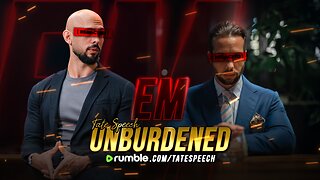Premium Only Content

Episode 2304: Understanding the Sins of Omission and Commission
In this episode, we will delve into the concepts of the sins of omission and commission, understanding their significance and implications from a traditional Catholic perspective. Our reflection will be guided by scripture, the writings of the saints, and the teachings of the Church. Let’s embark on this spiritual journey together.
The reason I decided to do this episode is that many people feel that if they are indifferent that can be sinning since they are neither acting or taking a position that God may deem sinful. Quite the contrary. When you do not act you in essence deny God by your act of Omission. Just because you may not commit a sin does not mean you can just deny it offends God.
Definition:
Sin of Commission: These are wrongful actions we actively perform. Examples include lying, stealing, and other direct violations of God’s commandments.
Sin of Omission: These are good actions we fail to perform. For example, not helping someone in need, failing to pray, or neglecting to attend Mass or not standing up against sinful acts that offend God.
Now let me provide the story of Moses striking the rock and the consequences for both Moses and Aaron are found in Numbers 20:1-13. According to this passage, God instructed Moses to speak to the rock to bring forth water for the Israelites. Instead, Moses struck the rock twice with his staff. This act of disobedience and lack of trust in God's command resulted in God decreeing that neither Moses nor Aaron would enter the Promised Land.
Here is the relevant passage:
And having gathered together the multitude before the rock, he said to them: Hear, ye rebellious and incredulous: Can we bring you forth water out of this rock?
And when Moses had lifted up his hand, and struck the rock twice with the rod, there came forth water in great abundance, so that the people and their cattle drank.
And the Lord said to Moses and Aaron: Because you have not believed me, to sanctify me before the children of Israel, you shall not bring these people into the land, which I will give them.
Contextual Breakdown:
God's Command: God specifically instructed Moses to speak to the rock to bring forth water (Numbers 20:8).
Disobedience: Moses struck the rock twice instead of speaking to it.
Lack of Faith and Trust: God emphasized that the failure was not merely in the action but in the lack of trust and faith in God's word, as well as failing to sanctify Him in the eyes of the Israelites.
Joint Responsibility: Although Moses was the one who physically struck the rock, Aaron's role as a leader and his involvement in the event meant he also shared in the responsibility and the subsequent punishment.
Theological Insights:
Sanctifying God Before the People: Moses and Aaron's actions were meant to demonstrate God's holiness and power. By not following God's instructions precisely, they failed to honor Him appropriately.
Leadership and Accountability: As leaders, Moses and Aaron were held to a higher standard of obedience and faith. Their actions had significant implications for their leadership and their relationship with God.
God's Justice and Mercy: This incident illustrates both God's justice in holding His leaders accountable and His mercy in still providing water for the people despite their leaders' disobedience.
The punishment for Moses and Aaron not entering the Promised Land was a direct consequence of their collective disobedience and lack of trust in God at the waters of Meribah. This event underscores the importance of faithfulness and obedience to God's commands, especially for those in positions of leadership.
How about Moses and the circumcision of his son?
One of biggest mistakes modern Catholic and the Catholic leadership make is the draw a had line between the old and new testament, In that everything God the Father did in the old testament was then and once Christ created the new convenant nothing before that was relevant. So very wrong. Why? Is God not the same always? Past present and Future? Of course he is.
Let me explain what I mean.
The Bible does not explicitly state why Moses had not circumcised his son before the incident described in Exodus 4:24-26. And when he was in his journey, in the inn, the Lord met him, and would have killed him.
Immediately Sephora took a very sharp stone, and circumcised the foreskin of her son, and touched his feet, and said: A bloody spouse art thou to me. And he let him go after she had said: A bloody spouse art thou to me, because of the circumcision.
Several theories and interpretations have been proposed by scholars and theologians:
Possible Reasons
1. Cultural Differences:
• Midianite Influence: Zipporah was a Midianite, and her cultural practices might not have included circumcision. Moses, living among the Midianites for many years, may have been influenced by their customs or deferred to his wife’s cultural background.
• Family Disagreement: There might have been a disagreement between Moses and Zipporah regarding the necessity of circumcision. Zipporah’s decisive action during the incident suggests she understood the importance of the act, but there might have been prior resistance.
2. Negligence or Oversight:
• Busy with Other Duties: Moses was preoccupied with his mission to confront Pharaoh and lead the Israelites out of Egypt. The pressing nature of his task might have led to an oversight regarding his son’s circumcision.
• Assumption of Safety: Moses might have assumed that as long as they were outside the land of Israel, strict adherence to all covenantal rituals might not be as urgent.
3. Personal Reluctance:
• Unresolved Trauma: Moses might have had personal reluctance due to his own experiences and fears. Circumcision is a significant and potentially traumatic event, and he might have hesitated to subject his son to it.
• Spiritual Struggle: Moses might have been experiencing a spiritual struggle or doubt about his mission, leading to a delay in fulfilling all the covenantal requirements.
Theological Implications
1. Divine Reminder:
• The incident serves as a stark reminder of the importance of covenantal faithfulness. It underscores that even a leader as significant as Moses must adhere to God’s commands and ensure his family does the same.
• The urgency and severity of God’s action highlight the non-negotiable nature of the covenantal sign of circumcision.
2. Intercessory Role of Zipporah:
• Zipporah’s intervention shows that God can use anyone, regardless of their background, to fulfill His purposes. Her role in this episode is crucial and demonstrates the importance of immediate obedience to God’s commands.
3. Preparation for Leadership:
• This event could be seen as a test or preparation for Moses, ensuring that he and his family were in full compliance with God’s covenant before undertaking the monumental task of leading the Israelites out of Egypt.
While the Bible does not provide a clear reason for Moses’ initial reluctance or delay in circumcising his son, the incident itself underscores the importance of covenantal obedience and the readiness required for those whom God calls to significant tasks. It also highlights the critical role of Zipporah in ensuring that Moses fulfilled this vital covenantal obligation so she did not go along with his sin of commission and therefore was not complicite or suffered the sin of Ommission.
Now you may say “Boy God the Father was really tough on Moses”. Yes he was and do you think Christ will be any less tough? No! Why? Because Christ is God and God is the same past, present and future. He does not change and neither does the sin of commission or omission. We don’t get to change the rules and say God will be what I want him to be. Today is not different.
Scripture Reading:
James 4:17: "So whoever knows the right thing to do and fails to do it, for him it is sin."
This verse from James clearly defines the sin of omission. It emphasizes that knowing what is right and failing to act on it is sinful. It’s a call to actively live out our faith through good deeds and obedience to God’s will.
St. Augustine: "He who does not prevent sin when he can, encourages it."
St. Augustine’s words highlight the responsibility we have to prevent sin, not only in ourselves but also in others. This reflects the communal aspect of our faith, where we are called to help each other on the path to holiness.
Personal Responsibility: Each individual is responsible for their own actions. Ignoring opportunities to do good or prevent evil makes us complicit in the wrongdoing.
Communal Aspect: As members of the Body of Christ, we have a duty to encourage and support one another in living virtuously. Failing to intervene when we can help prevent sin is an omission.
Practical Application: Regularly examine your conscience, not just for sins of commission but also for missed opportunities to do good. Be proactive in seeking ways to help others and fulfill God’s will.
St. John Chrysostom: "It is not only the action itself, but the neglect of a necessary action, that condemns a man."
St. John Chrysostom emphasizes that neglecting necessary actions is equally condemnable. This reinforces the importance of active engagement in our faith and responsibilities.
Holistic View of Sin: Sin is not just about what we do wrong but also what we fail to do right. Our spiritual journey requires both avoiding evil and actively pursuing good.
Examples of Omission: This can include neglecting prayer, failing to care for the poor, or ignoring injustices. Our faith calls us to be vigilant and responsive to the needs around us.
Practical Application: Make a conscious effort to fulfill your duties, both spiritual and corporal. Engage in regular acts of charity and service, and be mindful of the ways you can positively impact others.
Theological Insight:
The Catechism of the Catholic Church (CCC 1868): "Sin is a personal act. Moreover, we have a responsibility for the sins committed by others when we cooperate in them by...not disclosing or not hindering them when we have an obligation to do so."
This teaching underscores our responsibility not just for our own sins but also for preventing sin in others when we have the capacity to do so.
Practical Steps:
Examination of Conscience: Regularly review your actions and inactions. Reflect on how you can better fulfill your obligations to God and neighbor.
Sacrament of Reconciliation: Confess not only your sins of commission but also those of omission. Seek grace to be more attentive and responsive to God’s will.
Active Faith: Engage in acts of charity, prayer, and service. Look for ways to live out your faith actively, not passively.
Matthew 25:41-46: "Then he will say to those on his left, ‘Depart from me, you cursed, into the eternal fire prepared for the devil and his angels; for I was hungry and you gave me no food, I was thirsty and you gave me no drink...’"
This passage from Matthew’s Gospel is a stark reminder of the consequences of sins of omission. It illustrates that our failure to act in love and charity towards others is a serious offense in the eyes of God.
Conclusion:
As we conclude this episode, let us take to heart the profound teachings on the sins of omission and commission. Reflect on St. Augustine’s call to prevent sin, St. John Chrysostom’s reminder of our duty to act, and the Catechism’s emphasis on our communal responsibility. Let us strive to live our faith actively, fulfilling our duties to God and neighbor with love and diligence. Thank you for joining may you be blessed with the grace to recognize and fulfill God’s will in every aspect of your life. Until next time, may your journey be guided by faith and illuminated by God’s love. God bless.
-
 LIVE
LIVE
Vigilant News Network
19 hours agoRFK Jr. Hearing EXPOSES Corrupt Politicians in Humiliating Scandal | Media Blackout
1,835 watching -
 LIVE
LIVE
Tate Speech by Andrew Tate
1 hour agoEMERGENCY MEETING EPISODE 105 - UNBURDENED
12,044 watching -
 1:01:18
1:01:18
Tactical Advisor
4 hours agoBuilding a 308 AR15 Live! | Vault Room Live Stream 016
27K5 -
 11:33
11:33
DeVory Darkins
19 hours ago $16.54 earnedJustin Trudeau PANICS after Trump slaps Canada with AGGRESSIVE Tariffs
78.6K174 -
 19:11
19:11
Stephen Gardner
1 day ago🔥HOLY CRAP! Chuck Schumer UNDER INVESTIGATION | 3 HUGE Trump MOVES explained!
92.2K249 -
 4:53:35
4:53:35
Rotella Games
9 hours agoGrand Theft America - GTA IV | Day 4
42K5 -
 LIVE
LIVE
Scottish Viking Gaming
7 hours ago💚Rumble :|: Sunday Funday :|: Rumble Fam Knows What's Up!!
272 watching -
 LIVE
LIVE
ttvglamourx
6 hours ago $2.69 earnedEGIRL VS TOXIC COD LOBBIES !DISCORD
295 watching -
 3:19:17
3:19:17
LumpyPotatoX2
8 hours agoSCUM: Lumpy Land RP Server - Day #1 - #RumbleGaming
68.6K2 -
 1:42:59
1:42:59
Game On!
21 hours ago $8.68 earnedTop 10 Super Bowl Bets You Can't Afford To Miss!
94.1K9